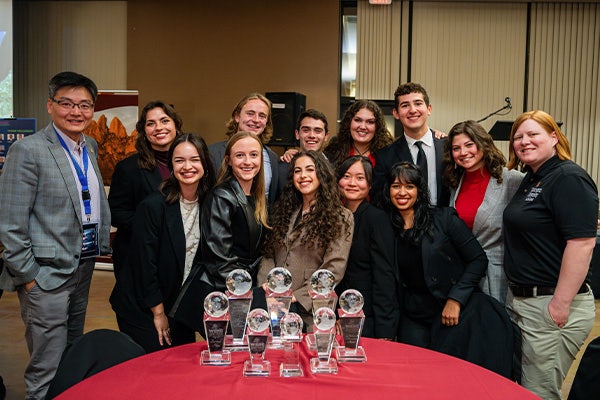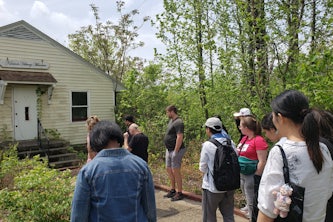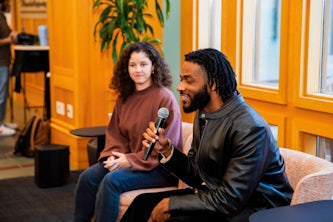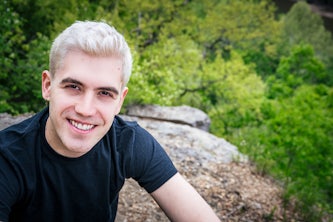Environmental Engineering Capstone students were ‘teams to beat’ at national contest
Students brought home eight awards for their environmental designs

Students in the Environmental Engineering Capstone course in the McKelvey School of Engineering at Washington University in St. Louis won eight awards at the WERC Environmental Design Contest at New Mexico State University April 7-10, 2024.
“This is a high-profile event that is the gold standard for environmental design competitions in the nation,” said Joshua Yuan, chair of the Department of Energy, Environmental & Chemical Engineering and the Lucy & Stanley Lopata Professor. “That we won the most awards among all universities says a lot about the quality of our program and students.”
“We were the teams to beat this year,” said Kristen Wyckoff, senior lecturer in energy, environmental & chemical engineering. Wyckoff and Zhen (Jason) He teach the course.
Eleven Environmental Engineering students comprised two teams for the contest, which charges teams with designing a working bench-scale system that provides proof of concept for one of various tasks. The tasks for the 2024 competition included stormwater management, net zero electrical grid, modular carbon dioxide removal, water treatment, and their own proposed environmental challenge. Eighteen teams competed this year from across the United States.
One WashU team won first place overall for Task 4, which was to design an innovative carbon-dioxide removal system in modular units that could be duplicated throughout a community and across many communities. In addition, the team won first place for flash talk, second place for bench scale and the P2 award for pollution prevention. Team members were Juli Aronson, Serena Earp, Elana Lerner, Maya Mehrotra, Bella Stull and Max Trachtenberg.
For inspiration, Mehrota, her team’s leader, said some team members visited the water treatment plant in O’Fallon, Missouri, as they designed their modular carbon capture system. They also had help from Ben Kumfer, research assistant professor in energy, environmental & chemical engineering.
“Ben was huge in our success — we cannot credit him enough,” said Mehrota, who also won the Terry McManus Outstanding Student Award. After graduating in May, she will be moving to Berkeley, California, to work for Aircapture, which does carbon capture for manufacturing sites.
Trachtenberg said the hands-on project gave him a new perspective on lab research.
“The Capstone course gave me an idea of how to explore and be creative and to figure out what’s working and what’s not working,” said Trachtenberg, who plans to begin working at Bunge North America in St. Louis following graduation. “When we got to see it all work at the competition and stand up there and have the judges tell us we did a great job, it was the culmination of a lot of work. It was very fulfilling in the end.”
The other WashU team won second place overall for Task 5, which was to treat saltwater disposal well wastewater to deionized quality for hydrogen energy production. The team also won the outstanding team award and the peer award. Team members were Matt Greenberg, Jordan Lin, Frankie Lynch, Kaelan Smyser and Serene Tomaszewski.
Students estimated they spent an average of 20 hours a week since October 2023 planning, designing and building their projects, which brought them together as teams.
“This project taught me a lot about lab experience, how to overcome challenges and persevere through bad results,” said Lynch, who will begin a master’s program in environmental engineering at WashU next fall. “What I recognized at the competition is to trust in your teammates. We gave multiple presentations at the competitions, and not all the teammates participated in every presentation. It took a level of trust and confidence in our peers that they would perform well and articulate the aspects and goals we had set for ourselves.”
Smyser, the Task 5 team leader, said the environmental engineering program at McKelvey Engineering gave the team an advantage over its competitors.
“The program’s focus on chemical engineering set our solution apart from the others,” said Smyser, who is going into investment banking after graduating. “We used a solution that was more about the chemistry behind the water treatment, and that gave us a competitive edge.”







